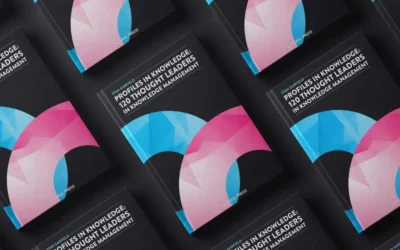Seeing the Wood for the Trees—A Conversation with Euan Semple
Phil Green
Earlier this year, we presented a “KM Conversation” with well-known enterprise social network expert, author and consultant Euan Semple. During our session “The New Knowledge Ecosystem: Content and Connection,” Euan shared valuable insights on how information experts play a social media curator role that helps us “see the wood for the trees.”
Per Euan Semple, the speed with which information comes at people is increasing all the time and they do feel swamped; it’s coming in 24/7/365, and information professionals who respect other people’s time and attention while delivering the extra value of “finding the good stuff” play an extremely valuable role.
In fact, Euan argues that it’s the responsibility of information experts to “think hard about what we share, what we argue for and against, what we turn down or ignore.” As nodes in the network, there’s a potential we all have to step forward and help others to see the wood for the trees.
When the knowledge signal-to-noise ratio is out of whack, people struggle with the productivity issue of dealing with volume, and the strategic and psychological issues of being confident that they are getting to the right information, and making decisions in the best way they can.
We’re Only Human
People do use trusted output to make better judgements about what matters and what is interesting. In addition to establishing credibility by respectfully delivering value, the most trusted social media participants offer a bit of a human touch. They do share just a little information about themselves as people. (The title of Euan’s book, Organizations Don’t Tweet, People Do, is a good reminder that a 140 character press release from a business isn’t necessarily trust-building.)
It’s a Matter of Trust
Some people facing the challenge of consuming information via social media realize that one can actually manage through the networks, e.g. Twitter. Per Euan Semple, Twitter in effect “filters the web.” For example, he has a group of ~100 to whom he pays attention (this is a subset of the total number of people he follows) because it’s become clear that they’re good hunters and gatherers. They’re good at finding the right stuff, being relevant and making sure the signal is high, as opposed to the noise.
Information experts respected as such on social media are real, obviously connected, and vulnerable.
Not every blog or post or tweet has to be self-revealing or profound; some of the best actually represent curation of information. The skills involved in finding the good stuff and filtering it for the audience are natural to librarians and other knowledge workers. Many people are reticent to promote themselves, or to be seen as knowledgeable, but networks do work best when we are willing to step up and demonstrate that we are valuable, accessible and helpful.
This relates to digital citizenship, a topic that we’ve posted about before on Think Clearly. A social media presence enables qualified “digital citizens” (those people who “use information technology (IT) in order to engage in society, politics, and government participation”) to fulfill the promise of networks and share their wisdom with the crowd.
Hear more from Euan Semple and Phil Green on this and related topics when you link to “The New Knowledge Ecosystem: Content and Connection.”
Similar Posts
Only You Can Prevent Knowledge Loss: How to Practice “Knowledge Archaeology”
An overview of ways in which knowledge is lost, with examples of how to perform knowledge archaeology to recover and restore it.
Ready to Read: Profiles in Knowledge: 120 Thought Leaders in Knowledge Management
We are pleased to announce that Stan Garfield’s new book, Profiles in Knowledge: 120 Thought Leaders in Knowledge Management, is now available from Lucidea Press.
Lucidea’s Lens: Knowledge Management Thought Leaders Part 92 – Jay Liebowitz
Jay Liebowitz is a professor, consultant, author, and editor. His research interests include knowledge management, data analytics, intelligent systems, intuition-based decision making, IT management, expert systems, and artificial intelligence.
Lucidea’s Lens: Knowledge Management Thought Leaders Part 91 – Frank Leistner
The late Frank Leistner was the former Chief Knowledge Officer for SAS Global Professional Services, where he founded the knowledge management program and led a wide range of knowledge management initiatives up until 2012.



